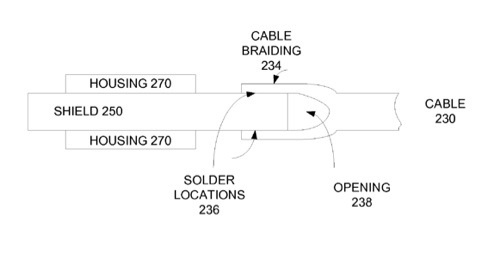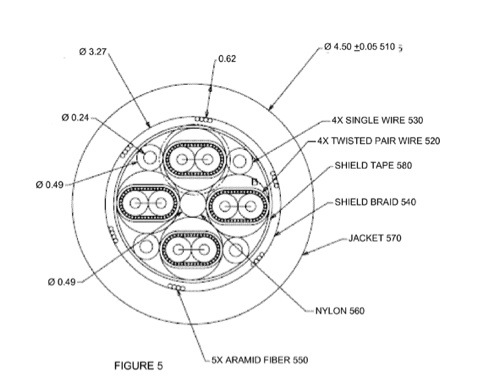Apple working on high-speed connector inserts, cable
An Apple patent (number 20120152613) for high-speed connector inserts and cable has popped up at the U.S. Patent & Trademark Office.
Per the patent, high speed connector inserts and cables having improved heat conduction, high strength, and may be manufactured in a reliable manner. One example may provide a connector insert having several paths by which heat may be removed from circuitry in the cable insert. In one example, heat may be removed from one or more circuits by forming a thermal path between a circuit and a shield of the connector insert.
Another path may include one or more pads on a side of an integrated circuit board that are soldered directly to the shield. A braiding surrounding a cable may be soldered or otherwise thermally connected to the shield. Another example may provide a cable having a braiding that includes one or more types of fibers, such as aramid fibers. Another example may provide for increased manufacturability by using a wire comb and a solder bar.
Here's Apple's background on the invention: "The amount of data transferred between and among electronic devices has increased tremendously. Applications such as high-definition video require huge amounts of data to be transferred at very high data rates. Unfortunately, high-speed communications between electronic devices have become so fast that simple cables consisting of two inserts connected by wires are no longer suitable. These simple cables degrade signals and cause skews such that high-speed data communication is not reliable.
"Accordingly, new cables are needed. These cables may be active in that they include active electronic components, such as integrated circuits. These circuits consume power and thus create heat. This heat can degrade reliability of the cable and its circuitry, and can also be unpleasant for a user to touch.
"These cables may experience forces and mechanical stress during use. Given their complexity, it may be useful to provide cables having increased strength. Also, given their complexity, problems with manufacturability may be a concern.
"Thus, what is needed are circuits, methods, and apparatus for high-speed cables that can reliably convey signals in high-speed communications. The cable inserts may be able to transfer heat in a way to improve user experience and cable reliability. The cables may have increased strength. The cables and connector inserts may be arranged in such a way as to provide improved manufacturability."
The inventors are Min Chul Kim, Paul Yuan, Josh Pong and Joseph Tang.














